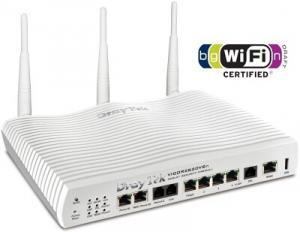 Internet Router
Internet Router
Your Internet Router is the heart of your network and controls the connection between the local network and the Internet.
Some advanced routers can manage multiple broadband connections and remote users. Many routers also include a firewall which protects the network from cyber-attacks.
Atomik.biz offers configuration and management for most brands of Internet routers.
Atomik.biz is a Draytek Advanced Network Partner, so it recommends Draytek products for most new installations in small to medium-sized offices.
Modern Internet connections are reasonably reliable but do fail. How often broadband connections fail is a postcode lottery. Your luck is down to the length and condition of the copper wires to your premises. In some cases, poor weather can cause problems, including water getting into wiring in heavy rain or above-ground wires being affected by strong winds.
Fault-tolerant Internet connections
For nearly all businesses, we recommend fault-tolerant and load-balanced solutions. Fault-tolerant Internet means having two or more Internet connections from different suppliers connected to a single Internet router. The router has multiple paths to send and receive data, so when one connection fails, the router will route traffic to the other link.
Internet connections can be ADSL, VDSL, 4G, EFM, Fiber, or Ethernet.
Applications like VoIP telephony and Internet banking require more control. Correctly programming the router ensures the best performance.
It is possible to prioritise some network traffic above others. Quality of Service (QoS) will ensure the best voice quality with VoIP phone systems. Businesses using free Internet routers provided by their ISP should consider upgrading to a business-quality router to benefit from improved performance.
Why buy a router?
People sometimes ask, why should I buy an Internet router if my Internet Service Provider supplies one for free?
The answer is Performance, Reliability, Features and Security. Routers supplied with a broadband connection are cheap enough not to price the package out of the market and to be good enough for basic use. These are usually fast, reliable and good enough for most home users and for simple business use.
In any case, “free” routers are not free at all. They are low-cost, simple routers with the cost spread over the length of the contract. Most people keep their connection beyond the original contract, so they end up paying for their “free” router more than once. Some Internet service providers will sell you a wires-only circuit. You then buy a better-quality router and pay for it only once.
BT WiFi shared Internet
BT routers have an additional network which allows BT users to connect to other BT users routers when away from home. This works using a BT-WiFi SSID. BT claims the home user gets priority over the guest user and that the guest user network is isolated from the home network. This should mean that guest users should never affect home user performance. Even if that was not true the “guest user” is unlikely to use much bandwidth and the “host network” is unlikely to be pushed to capacity.
BT want as many BT supplied routers in homes as possible as it gives wider coverage for the BT WiFi network and gives them an advantage over other providers.
Security vulnerabilities are regularly found in network equipment and BT routers are as likely as any other to have security risks.
Despite BT assurances many people are not comfortable with the idea of unknown users using their connection without their knowledge. Owning your own router allows total control of who uses your connection and allows monitoring of security updates.
Business quality routers
Advanced home users and business owners need a better-quality device. Broadband lines are not always up to specification, and a better-quality router might well work where a low-cost one won’t. A better router will include better diagnostics to find the problem, which saves time and money as well as time on calls to the ISP.
A business-class router will offer features not found in “free” ones. The DrayTek Vigor 2865 series is an excellent example of a quality router and is DrayTek’s most popular router.
Business-class routers offer support for multiple Internet connections. Multiple LAN links are useful where several businesses share an Internet connection and want security from each other. Professional routers provide users with secure remote access using Virtual Private Networking. Suitable routers offer permanent VPN connections between premises. Some quality routers can manage a meshed wireless network when combined with compatible wireless access points.
Internet security
Using a quality router and configuring it correctly will improve network security. A basic router provided by your ISP will have a default setup and will probably have many features enabled that you don’t need. These services increase the attack surface used by hackers to compromise your network. Turning off unnecessary services and closing unused ports makes you safer. Some ports on low-quality routers can’t be closed.

